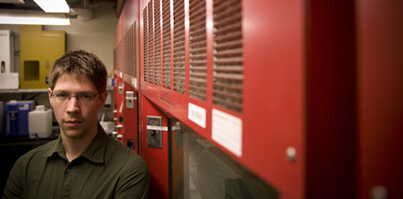Profile: Ryan Cunningham: Making a difference in mining
Profile: Ryan Cunningham: Making a difference in mining McGill University
User Tools (skip):
PROFILE
Ryan Cunningham: Making a difference in mining

Ryan Cunningham, Master’s student in the Department of Materials Engineering, is hoping to make the much-maligned mining industry a little greener.
There is no shortage of people who "want to make a difference" in the world these days. But while many of us share that admirable ambition, it's often a case of "easier said than done." That's what sets McGill student Ryan Cunningham apart. He pretty much knows how he wants to make the world a better place. He wants to improve processes in an area that is much maligned in these environmentally sensitive times – the mining and metals industry.
The 24-year-old first-year master's student in the Department of Mining, Metals and Materials Engineering was raised on his parents' dairy farm in Huntington, about an hour southwest of Montreal. And although he didn't aspire to wake at dawn and milk the cows for the rest of his life, Cunningham's background is at least somewhat responsible for his chosen field of study.
"I didn't want to be a dairy farmer, but I like the whole idea of working with your hands, getting involved," he said.
Cunningham, who completed a Bachelor of Engineering degree at McGill in 2006, was originally interested in studying biomaterials engineering, but eventually became captivated by the scope of and possibilities found in mineral process engineering.
"Here at McGill we have a really broad scope of activities in this area. Anything involving materials – from surfaces, to making special materials, to extracting them from the ground is in this department. Actually, if you haven't really decided what you want to do, this is a good place," Cunningham said. "You can go toward nanotechnologies or toward mining, which is a really good industry for application."
Making the "bad guys" better
While he's aware mining companies tend to make headlines for all the wrong reasons these days, Cunningham said doing away with mineral extraction altogether is more than a little unrealistic, at least for the immediate future.
"Mining companies are often painted as the bad guys because of the perceived impact mining has on the environment, and there is some truth to that." Cunningham said. "But a fundamental fact is that people need metals. You want to drive a car, farm your land or ride a bike… you need metals. Mining is not going to go away."
Cunningham's principal interest lies in exploring new technologies to reduce the amount of energy consumed to supply the world's metal needs.
"Really, if you want to make a difference to the environment, improve a process in mineral extraction. In my life I want to make improvements in mining so at the end of the line I can say I have decreased the world's energy consumption by 'x amount.' The fact is, the mineral extraction industry consumes approximately three per cent of the world's energy. If you can make improvements there you make a significant improvement to the world, so that's my passion and where my future lies".
Hydro-Québec scholarship
Cunningham's ambitions have been helped by a series of scholarships and awards he won while doing his BEng and more recently for his master's work. He is the recent recipient of an annual $10,000 scholarship from Hydro-Québec, part of a $10-million donation the utility made to the university in October 2007.
"Receiving the scholarship has given me the freedom to focus on my research, and to be involved in many clubs and projects, too," Cunningham said.
One of those projects is an upcoming discussion forum, called Dirt and Dessert, where experts from the field of mining will speak on a variety of topics, including the role of recycling in the mining industry and the recruitment of aboriginal people as future mining industry employees. The second installment, featuring Cunningham's master's advisor, Professor Jim Finch, is scheduled for March 27 from 3:00 to 4:00 p.m. at the Wong Building.

